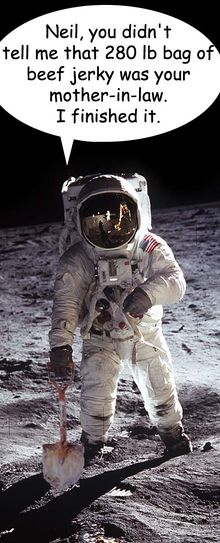The Apollo Program (TV series)
The Apollo Program was a US television science fiction series from the 1960s and 1970s about men attempting and finally succeeding in travelling to the moon. The series was structured as a set of 17 missions, with episodes about various aspects of preparation for each, then the actual trip.
The series was very popular, its best episodes garnered television ratings which have not been bettered to this day. The popularity meant excerpts were shown in news bulletins as well as their normal scheduled slots.
The early missions were trips into earth orbit, or orbits around the moon. The most famous mission was number 11 where the "astronauts" (as they were called) actually landed on the moon.
Like most television at that time, the series was broadcast live and there were often little ad-libs and deviations from the script. One of those occurred at the crucial moment of setting foot on the moon for the first time. The script called for the character Buzz Aldrin to be the first out, but the actor Philip McCracken playing Armstrong said "look over there" and jumped out of the lander while Aldrin's back was turned.
This was obviously a spur of the moment thing, since if McCracken had planned it then surely he would have thought of something memorable to say when he got out. Or perhaps he simply never anticipated the television celebrity which would follow him after that episode.
Reality controversy[edit | edit source]
The series was in a pseudo-documentary style, a style which was then very new. This newness encouraged many to believe the series was real! It was an understandable mistake, since the theoretical reality of space travel had been established back in the 1930s when Martian forces invaded earth in the so-called War of the Worlds. Of course neither in that war nor since have humans been able to leave Earth's atmosphere, on account of the lack of air in space.
Various detailed explanations of the impossibility of what was depicted in the Apollo programs sufficed to put the matter beyond any doubt viewers might have, and the explanations even added to the prestige of the series, since it was very realistic, apart from its impossibility.
But not everyone was convinced, and today there remain various groups of morons, drongos and nutters who continue to believe human space travel is possible (beyond the scant few minutes out of the atmosphere that has been developed since the 1960s). These individuals are, on the whole, more deserving of pity than scorn, and a sub-field of psychiatry has developed to categorize and help them with their various delusions.
Ironically its various production flaws in the original series which have fed the delusions of reality. At particular points in the series some of the lights on the set were reflected in the actors face-masks, or the background star field didn't show up on camera, or flags were disturbed by drafts. These flaws have been interpreted instead by the reality-theorists as proof of reality! They provide long and specious pseudo-scientific calculations about what it must be like on the moon and why those things would really happen, and hence why the government must have really gone there and setup secret bases.
One of the worst reality-nuts called Bill Tucker in 2002 confronted Dave Small, the actor who played Buzz Aldrin, on his way to a television sci-fi conference in Philadelphia and harangued him, trying to make him tell the "truth" about what happened. Small tried reasoning with him, tried telling him to go away, but when that failed gave him a punch on the nose.
Further reading[edit | edit source]
- Latimer, Hugh, Survey of the pathology of Apollo-realist tendencies, J. Psych., v.27 n.1, 1978.
